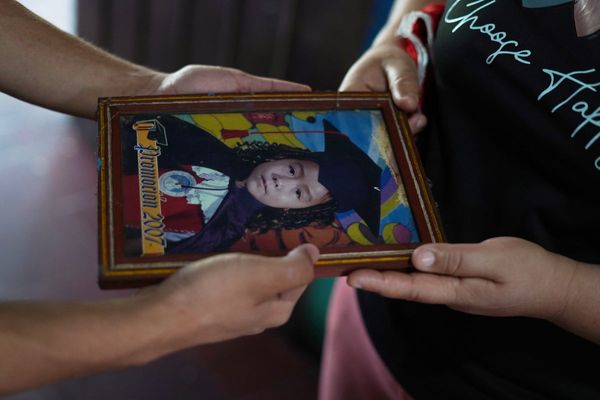The people who become Vladimir Putin’s pawns never realize the vicious game ensnaring them.
Until it’s too late.
WNBA star Brittney Griner made the mistake of carrying in her luggage vape cartridges with a minuscule amount of cannabis oil as she traveled to Russia to play basketball in February. Nine months later, Griner found herself in a penal colony outside Moscow on a drug possession conviction that hardly warranted the nine-year sentence she began serving.
On Thursday, Griner’s unimaginable ordeal came to an end. A prisoner swap negotiated between the Kremlin and President Joe Biden sent Griner on her way home in exchange for Viktor Bout, the Russian arms dealer known to the world as the “Merchant of Death.”
Griner’s reunification with her wife, Cherelle Griner, her family and teammates on the WNBA’s Phoenix Mercury squad will surely be celebrated across America. At the same time, Americans should also celebrate Griner’s steely courage — she was up against a Russian leader with a notorious disdain for the rule of law, who is obsessed with what transactional gain he can extract from the plight of others.
Not involved in the swap was former U.S. Marine Paul Whelan, a corporate security executive arrested in Moscow in 2018 on espionage charges that the U.S. says were concocted by Russian authorities. Whelan was convicted in 2020 and remains imprisoned in Russia on a 16-year sentence.
What Putin wants in exchange for Whelan remains unknown, but we trust Biden is working on his release just as earnestly and expeditiously as his administration toiled to secure Griner’s freedom. The Kremlin rejected Washington’s bid to include Whelan in the Griner-Bout swap; Moscow preferred a one-for-one exchange, as it did in April when it agreed to release former U.S. Marine Trevor Reed in order to secure the homecoming of Russian pilot Konstantin Yaroshenko.
It’s an ugly game Putin plays, turning ordinary people into hostages he can stow away like poker chips. The price for Griner was steep. Washington has alleged that Bout’s arms clients have included al-Qaida and the Taliban. The inspiration for the Nicolas Cage character in the 2005 film “Lord of War,” Bout never cared who he was selling to or what side they were on. He ignored arms embargoes and sold weapons to rebels in Africa and government forces at war with those rebels.
Back in 2001, the distinguished Tribune foreign correspondent Paul Salopek wrote at length about Bout, after showing up at his apparent home in Entebbe, Uganda. “Arms leader leaves bloody trail,” was the apt headline on Salopek’s deep Tribune dive into the life of a very dangerous man.
Bout was convicted in 2011 in New York on charges that included conspiring to kill American citizens and sentenced to 25 years in prison, a term he was serving in a federal prison in Marion, Illinois, until his release Thursday. The U.S. has long suspected that Bout also had ties to Russia’s feared military intelligence agency, the GRU, which might explain the Kremlin’s fervent desire to return him to Russian soil.
Biden had no choice but to make the deal. The future Griner faced in Russia was harrowing.
Doing time in American prisons may be tough, but life in Russian prisons is even harsher. There remains a gulag-like aura to the Russian penal system. In interviews, Mikhail Khodorkovsky, the former oil tycoon who angered Putin and spent 10 years in Russian prisons, talked of forced labor, potatoes and bread for dinner, and barracks holding as many as 150 inmates.
In the prison to which Griner was sent, the 6-foot, 9-inch basketball star slept in a bed lengthened to accommodate her height, and shared a small cell with two inmates, The New York Times reported. She was allowed to go outside once a day for an hourlong walk in a small courtyard.
That’s all over now. Griner’s new future is a life back home, with her wife, her family and friends, and perhaps sometime soon, back on the court with her teammates. Griner already has two Olympic gold medals, and it would be America’s delight to see her vie for a third in Paris in 2024.
Biden deserves credit for Griner’s homecoming. In the meantime, however, the White House cannot waver in its mission to do the same for Whelan, who on Thursday told CNN via telephone, “I don’t know why I’m still here.”
The Biden administration should also take a closer look at the case of Marc Fogel, a Pennsylvania teacher whose case mirrors Griner’s. Earlier this year, a Russian court sentenced him to 14 years in prison after he was caught at a Moscow airport with medical marijuana in his luggage. The distinction that the administration makes is that it has deemed both Griner and Whelan as wrongfully detained, and has yet to apply that designation to Fogel. Biden’s team needs to investigate whether Fogel deserves the same status.
We expect Putin to reprehensibly treat Whelan, Fogel and any other American detained in Russia the same way he treated Griner — as a commodity, a bargaining chip.
Biden must do all he can to rescue Whelan and Fogel from Putin’s inhumanity.







